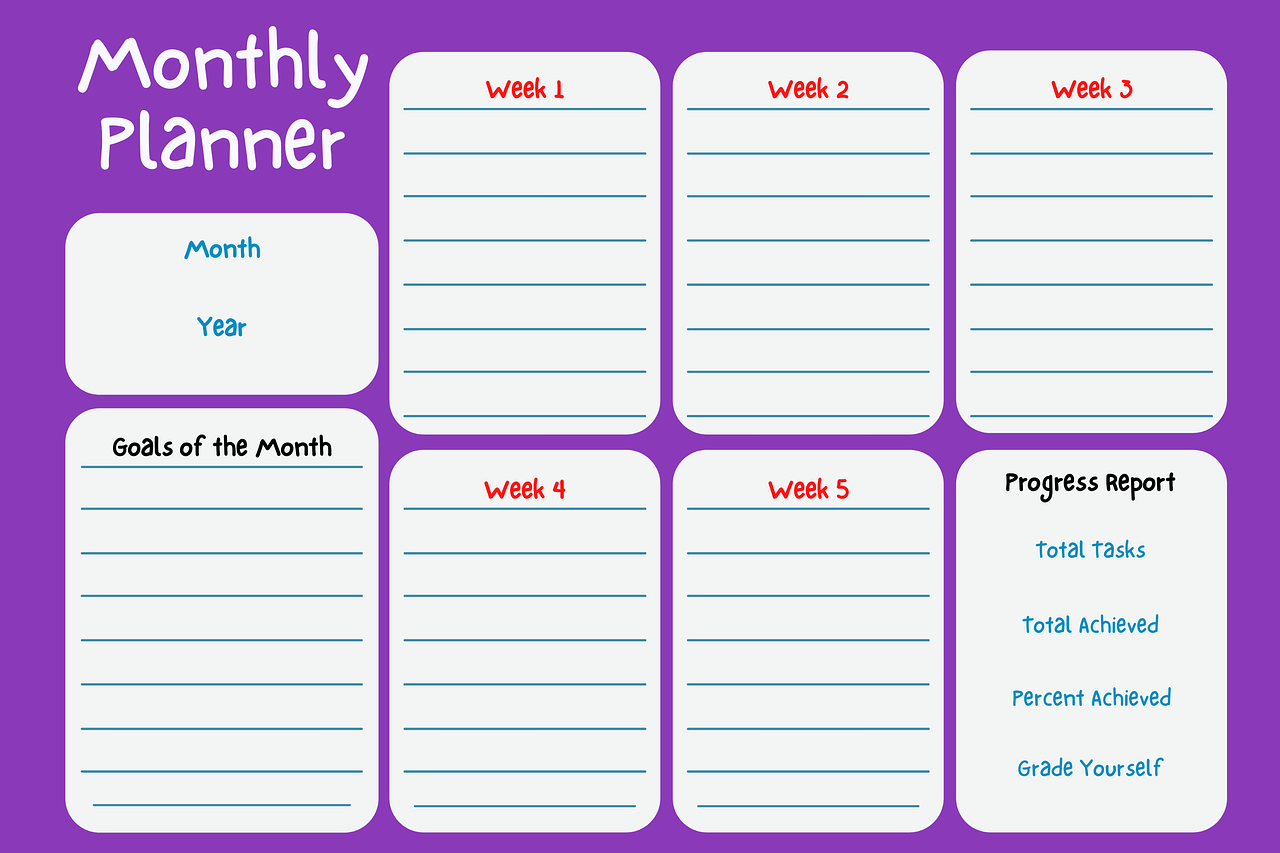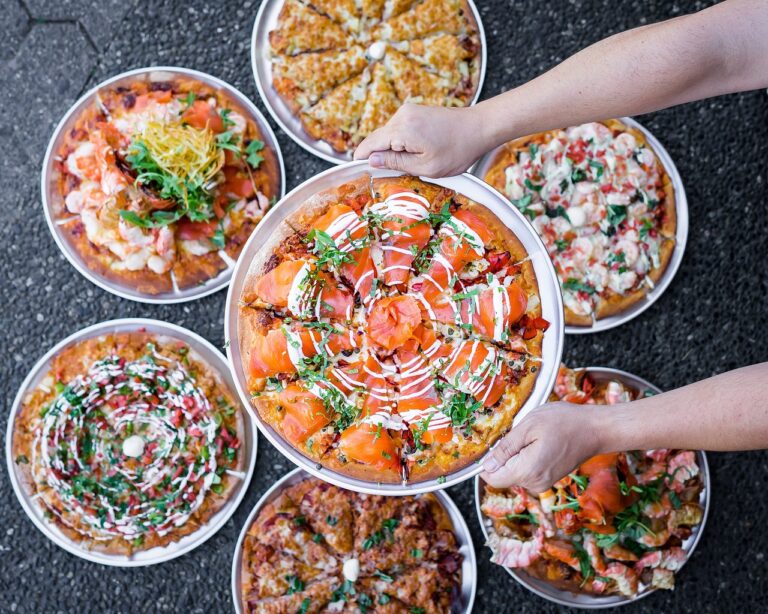Fuel Your Success: Meal Planning Secrets You Need to Know
Benefits of Meal Planning for Stress-Free Dinners
Meal planning is the practice of organizing and preparing meals in advance, with the goal of making dinnertime less stressful and more enjoyable.
| Tips for Stress-Free Dinners |
|---|
| Meal Planning |
| Plan your meals for the week ahead. Knowing what you’re going to cook in advance saves time and reduces stress. |
| Prep Ingredients in Advance |
| Chop vegetables, marinate meats, or pre-cook grains ahead of time to streamline cooking during busy evenings. |
| Keep a Well-Stocked Pantry |
| Make sure you have essential pantry staples on hand, like rice, pasta, canned beans, and sauces, for quick and easy meal assembly. |
| One-Pot Meals |
| Opt for dishes that can be cooked in a single pot or pan to minimize cleanup and simplify the cooking process. |
| Batch Cooking |
| Cook large batches of meals and freeze individual portions for future use. This saves time on busy nights when you don’t feel like cooking. |
| Utilize Slow Cookers or Instant Pots |
| These appliances can be a lifesaver for busy individuals. Simply toss ingredients in the morning, and come home to a delicious, ready-to-eat meal in the evening. |
| Get the Whole Family Involved |
| Assign tasks to family members to help with meal preparation, whether it’s setting the table, chopping vegetables, or stirring pots. |
| Set Realistic Expectations |
| Understand that not every meal needs to be elaborate or gourmet. Aim for simplicity and balance in your cooking routine. |
In today’s fast-paced world, where time is often at a premium, meal planning has become an essential tool for busy individuals and families alike. By taking the time to plan and prepare meals ahead of time, you can save time, money, and energy, while also making healthier choices for you and your loved ones.
Benefits of Meal Planning
Time-Saving
One of the most significant benefits of meal planning is its time-saving potential. By taking the time to plan your meals in advance, you can avoid the last-minute scramble to figure out what’s for dinner. Instead of staring blankly into the fridge, wondering what to cook, you’ll already have a plan in place, saving you valuable time and energy.
Cost-Effective
In addition to saving time, meal planning can also save you money. By planning your meals in advance, you can make more informed choices about what to buy at the grocery store, reducing the likelihood of impulse purchases or wasted ingredients. Additionally, by buying ingredients in bulk and cooking in larger quantities, you can take advantage of cost savings and stretch your food budget further.
Healthier Choices
Another key benefit of meal planning is the potential for making healthier choices. When you plan your meals in advance, you have the opportunity to incorporate a variety of nutritious ingredients into your diet, ensuring that you’re getting the nutrients your body needs to thrive. Additionally, by cooking at home more often, you can avoid the excess calories, sodium, and unhealthy fats often found in restaurant and takeout meals.
Getting Started with Meal Planning
Assess Your Schedule
The first step in meal planning is to assess your schedule and determine how much time you have available for meal preparation each week. Take into account any work commitments, family activities, or other obligations that may impact your mealtime routine. By understanding your schedule upfront, you can tailor your meal planning efforts to fit your lifestyle.
Set Realistic Goals
Once you’ve assessed your schedule, it’s important to set realistic goals for your meal planning efforts. Consider factors such as your cooking skills, dietary preferences, and time constraints when setting your goals. Start small and gradually build up to more ambitious meal plans as you become more comfortable with the process.
Gather Recipes and Inspiration
Before you start meal planning, take some time to gather recipes and inspiration for your meals. Browse cookbooks, websites, and food blogs for inspiration, and make note of any recipes that catch your eye. Consider factors such as seasonality, dietary preferences, and special occasions when selecting recipes for your meal plan.
Creating a Meal Plan
Choose Your Meals
Once you’ve gathered your recipes and inspiration, it’s time to create your meal plan. Start by choosing a variety of meals that you and your family enjoy, taking into account factors such as taste preferences, dietary restrictions, and nutritional needs. Aim for a balance of proteins, carbohydrates, and vegetables in each meal to ensure that you’re getting a well-rounded diet.
Make a Shopping List
With your meal plan in hand, it’s time to make a shopping list. Go through each recipe on your meal plan and make a list of all the ingredients you’ll need to purchase at the grocery store. Be sure to check your pantry and fridge for any items you already have on hand, and make note of any staples that need to be restocked.
Organize Your Kitchen
Before you start cooking, take some time to organize your kitchen and gather all the necessary equipment and utensils. Clear off your countertops, sharpen your knives, and gather all the ingredients and cooking tools you’ll need for each recipe. Having a clean and organized workspace will make the cooking process more efficient and enjoyable.
Meal Prep Techniques
Batch Cooking
One of the most effective meal prep techniques is batch cooking, which involves preparing large quantities of food at once and portioning it out for future meals. Choose one day a week to batch cook staples such as grains, proteins, and vegetables, and store them in the fridge or freezer for easy meal assembly throughout the week.
Freezing Meals
Another meal prep technique to consider is freezing meals ahead of time. Prepare large batches of your favorite recipes and portion them out into individual servings before freezing them for later use. When you’re ready to eat, simply thaw the meal in the fridge overnight and reheat it on the stove or in the microwave for a quick and easy dinner.
Prepping Ingredients in Advance
In addition to batch cooking and freezing meals, prepping ingredients in advance can also save you time and effort in the kitchen. Take some time each week to wash, chop, and portion out ingredients such as vegetables, herbs, and spices, and store them in airtight containers in the fridge. Having prepped ingredients on hand will make meal assembly faster and more efficient.
Tips for Successful Meal Planning
Stay Flexible
While meal planning is a great way to streamline your dinner routine, it’s important to stay flexible and adaptable. Life happens, and there may be times when your meal plans need to change at the last minute. Instead of stressing out about deviating from your plan, embrace the opportunity to try something new or improvise with what you have on hand.
Use Technology
Take advantage of technology to make meal planning easier and more convenient. There are countless meal planning apps available that can help you organize your recipes, create shopping lists, and even generate meal plans based on your dietary preferences and nutritional goals. Find an app that works for you and make it part of your meal planning routine.
Involve the Family
Meal planning doesn’t have to be a solo endeavor – get the whole family involved! Encourage your partner, kids, or roommates to weigh in on meal ideas, help
with meal prep, or take turns cooking dinner. Not only will this help lighten your load, but it will also foster a sense of teamwork and togetherness in the kitchen.
Overcoming Common Challenges
Lack of Time
One of the biggest challenges of meal planning is finding the time to do it. If you’re short on time, consider streamlining your meal planning process by focusing on simple recipes that require minimal ingredients and prep time. You can also make use of convenience foods such as pre-cut vegetables, canned beans, and rotisserie chicken to speed up meal prep.
Budget Constraints
Another common challenge of meal planning is sticking to a budget. If you’re trying to save money on groceries, consider planning your meals around inexpensive ingredients such as beans, lentils, rice, and pasta. You can also make use of sales, coupons, and discount stores to stretch your food budget further.
Picky Eaters
Dealing with picky eaters can also make meal planning more challenging. If you have picky eaters in your family, try to involve them in the meal planning process by letting them choose a meal or two each week. You can also try introducing new foods gradually, pairing them with familiar favorites to increase the likelihood of acceptance.
Tools and Resources for Meal Planning
Meal Planning Apps
As mentioned earlier, there are countless meal planning apps available that can help simplify the meal planning process. Some popular options include Mealime, Plan to Eat, and Paprika, all of which offer features such as recipe organization, meal plan generation, and grocery list creation to make meal planning a breeze.
Online Recipe Databases
In addition to meal planning apps, there are also numerous online recipe databases and websites where you can find inspiration for your meal plans. Websites such as Allrecipes, Epicurious, and Food Network offer a wide range of recipes for every taste and dietary preference, making it easy to find something that suits your needs.
Cookbooks and Blogs
Finally, don’t forget about traditional cookbooks and food blogs as valuable sources of meal planning inspiration. Invest in a few good cookbooks that align with your dietary preferences and cooking style, and bookmark your favorite food blogs for quick and easy access to new recipes and ideas.
Sample Meal Plans
Weeknight Dinners
Monday: Sheet Pan Chicken and Vegetables
Tuesday: Spaghetti with Marinara Sauce
Wednesday: Slow Cooker Chili
Thursday: Stir-fried tofu with Broccoli and Brown Rice
Friday: Pizza Night (Homemade or Takeout)
Weekend Brunches
Saturday: Avocado Toast with Poached Eggs
Sunday: Pancakes with Fresh Berries and Maple Syrup
Special Occasions
Birthday Dinner: Grilled Steak with Roasted Potatoes and Asparagus
Anniversary Celebration: Lobster Tails with Garlic Butter and Lemon
Incorporating Variety and Balance
Experiment with New Ingredients
One of the best things about meal planning is the opportunity to experiment with new ingredients and flavors. Challenge yourself to try at least one new ingredient or recipe each week, whether it’s a exotic spice, a seasonal vegetable, or a plant-based protein. You never know – you might discover a new favorite dish!
Balance Macronutrients
When planning your meals, aim for a balance of macronutrients – carbohydrates, proteins, and fats – to ensure that you’re getting a well-rounded diet. Include a variety of foods from each food group in your meals, such as lean proteins, whole grains, and colorful fruits and vegetables, to provide your body with the nutrients it needs to thrive.
Consider Dietary Restrictions
Finally, be sure to take into account any dietary restrictions or food allergies when planning your meals. Whether you’re vegetarian, vegan, gluten-free, or dairy-free, there are plenty of delicious and nutritious meal options available to suit your needs. Get creative in the kitchen and don’t be afraid to modify recipes to fit your dietary preferences.
Making Meal Planning a Habit
Establishing Routines
Like any habit, meal planning takes time and practice to master. Start by establishing a meal planning routine that works for you, whether it’s planning your meals on Sunday afternoon or doing a big grocery shop once a week. Stick to your routine as much as possible, and be patient with yourself as you learn the ropes.
Tracking Progress
As you get into the habit of meal planning, take some time to track your progress and reflect on what’s working and what’s not. Keep a journal or use a meal planning app to record your meals, recipes, and grocery lists, and make note of any successes or challenges you encounter along the way. This will help you refine your meal planning process over time and make it even more effective.
Celebrating Successes
Finally, don’t forget to celebrate your successes along the way! Whether it’s sticking to your meal plan for a whole week, trying a new recipe and loving it, or getting the whole family involved in meal prep, take the time to acknowledge and celebrate your achievements. Meal planning is hard work, and you deserve to pat yourself on the back for a job well done!
Conclusion
In conclusion, meal planning is a powerful tool for creating stress-free dinners and making mealtime more enjoyable for you and your family. By taking the time to plan and prepare meals in advance, you can save time, money, and energy, while also making healthier choices and experimenting with new ingredients and flavors. Whether you’re a seasoned meal planner or just getting started, I encourage you to give meal planning a try and see how it can transform your dinner routine. Happy cooking!


